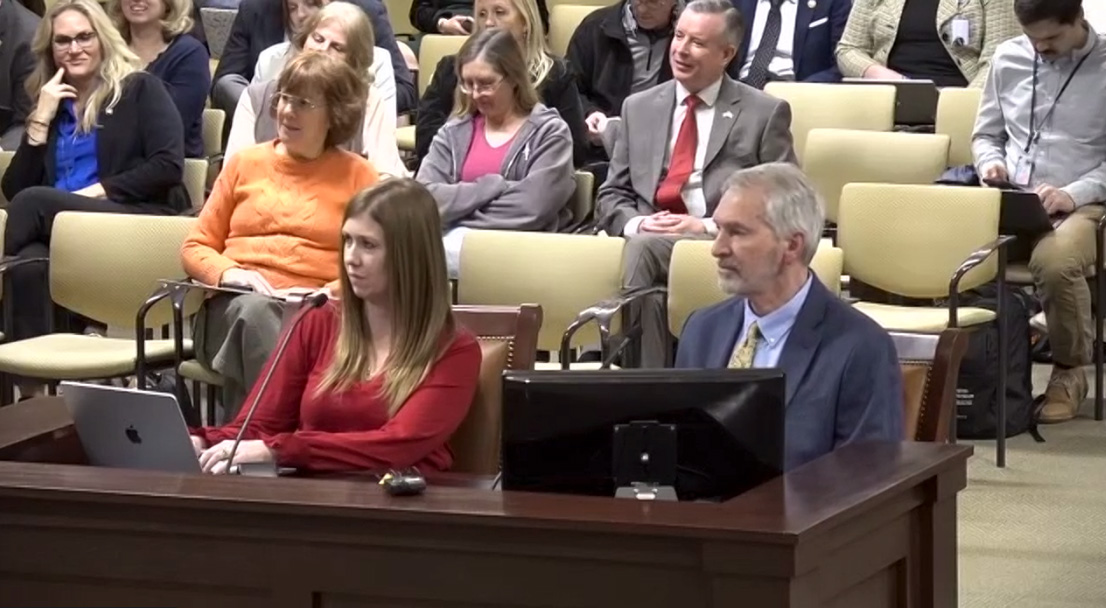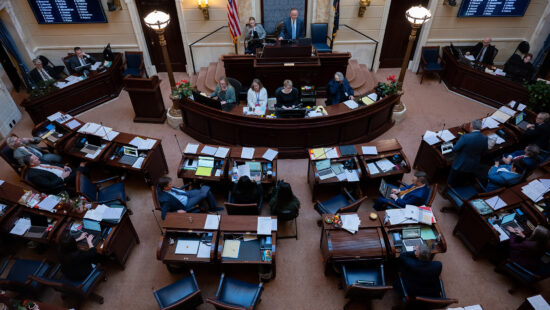Politics
Utah lawmakers advance bill to ban clerks from looking up voting records for political reasons

Rep. Stephanie Gricius, R-Eagle Mountain (left) and Utah County Clerk Aaron Davidson sit before the House Government Operations Committee on Wednesday, Jan. 22, 2025. Photo: Screenshot of state livestream
Bill prompted by Utah County Clerk Aaron Davidson actions, meant to set proper clerk ‘code of conduct,’ advances to the full House for consideration
Written by Katie McKellar for Utah News Dispatch
SALT LAKE CITY, Utah –
The first of many election bills that the 2025 Utah Legislature is expected to consider has already cleared its first legislative hurdle.
The House Government Operations Committee on Wednesday — the second day of the Legislature’s 45-day session — unanimously voted to approve HB69, a bill sponsored by Rep. Stephanie Gricius, R-Eagle Mountain, that would in some circumstances criminalize accessing and disclosing information about how or when an individual voter returns their ballot.
The legislation comes after some elected officials — including Sen. Mike McKell, R-Spanish Fork, who was recently elected to the Senate’s new Republican leadership team as majority assistant whip — have expressed concerns about Utah County Clerk Aaron Davidson tracking information on how at least two politicians returned their ballots, and criticizing them for not paying postage.
Davidson and McKell have clashed over Davidson’s earlier decision that Utah County would no longer automatically pay return postage for by-mail ballots, and Davidson instead encouraged voters to pay the $0.73 for their stamps. If they didn’t, the U.S. Postal Service would still deliver the ballot, but charge the county.
An earlier version of the bill was already endorsed in November by the Government Operations Interim Committee, when Gricius said the intention of the bill is to make clear to clerks “you cannot do a looky-loo at someone’s information for fun.”
Gricius did not specifically name Davidson while explaining her bill to the committee Wednesday, but she did say it was meant to address a “situation with county clerks accessing information, using them kind of for political purposes with the media.”
Davidson sat behind her in the committee’s audience, his arms folded and occasionally smiling as Gricius spoke. A few times during the meeting, he shook his head as lawmakers talked.
“We didn’t have time at that point to really get the bill right” in November, Gricius added, but after workshopping the bill, she said “we think we’ve got it figured out in a way that will protect the information that’s public, let that stay public, protect individual records and prevent that type of situation again.”
So Gricius on Wednesday brought a new version of it to the House committee. The new version would make clear voting history records — including the “method by which a voter returned a mailed ballot or whether the voter paid postage on a ballot returned by mail” — is classified as a private record that in most cases should not be disclosed.
The bill also states a “government officer” who has access to government information “may not access, use, copy, or release the information” unless it’s related to their professional duties. It would specify that releasing the information shouldn’t be done “for a primarily personal purpose,” including a “political purpose.”
An intentional violation of the bill would be a class B misdemeanor. If the full Utah Legislature approves it, it would take effect on May 7.
“Essentially, it kind of adds a code of conduct for county clerks to follow,” Gricius said. “You cannot use someone’s voting information for political purposes or access their information without a reason that is directly related to the course of your duties.”
Davidson, during the committee’s public comment period, continued to double down on his previous claim that Gricius’ bill was simply in response to a feud between him and McKell. “He’s the one that was politicizing it, not me,” Davidson said.
He also defended his actions of tracking certain elected officials’ voting methods, saying he was simply trying to encourage Utah County voters to use what he deemed the most “safe and secure” voting method, which was dropping their ballots off at a drop box rather than mailing them. “I was only looking at those people that were advocating to use the U.S. Postal Service to return their ballots,” Davidson said.
Rep. Cory Maloy, R-Lehi, then interjected. “You don’t see an issue with that?” he pressed Davidson. “Specifically pulling individuals because of something that you’re concerned about?”
Davidson then called McKell out by name and again criticized him for publicly advocating for voting by mail, and he said he didn’t think he did anything wrong. “It wasn’t illegal when I did it. Obviously it wasn’t illegal because you’re now having this meeting. It is a public record.”
Maloy spoke in favor of the bill, saying regardless of Davidson’s stance on voting by mail, the matter at hand was whether lawmakers should make clear what is and isn’t proper conduct for a county clerk or other government official.
“I really have an issue with looking at specific ballots to see how they were returned, especially as it relates to elected officials,” Maloy said. “We’ve had testimony here that ‘It was all the senator’s fault. He was the one that was politicizing.’ … But to specifically look at any group of people for whatever reason to see how they returned their ballot is going back to the code of conduct. It’s not good conduct, in my opinion.”
The House committee voted unanimously to endorse the bill. It now goes to the full House for consideration.



















